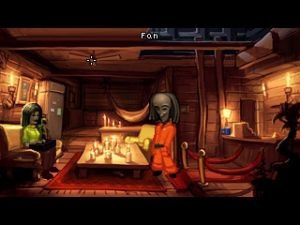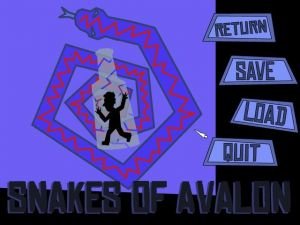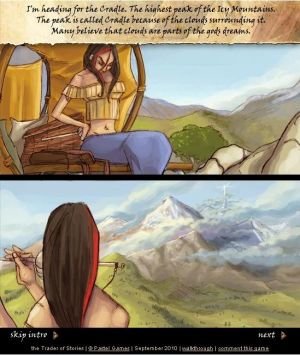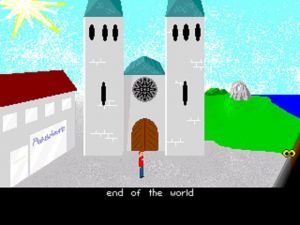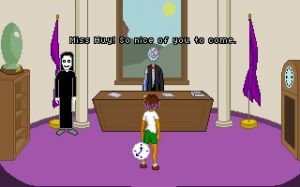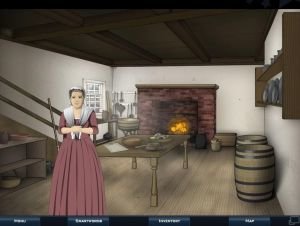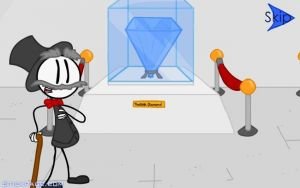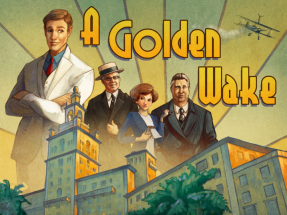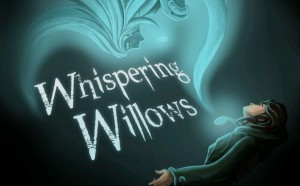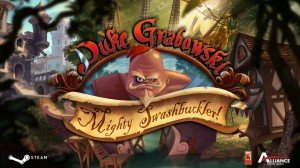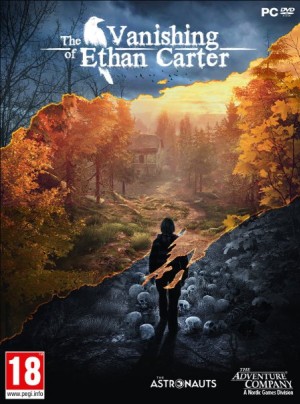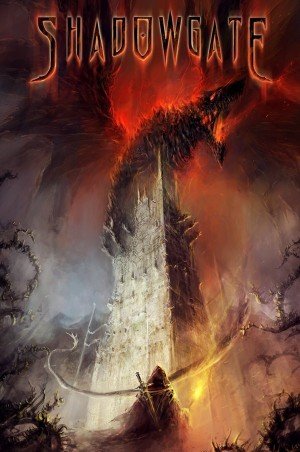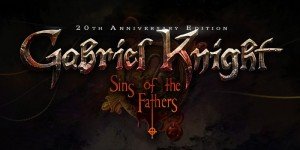Five Years of Following Freeware: Year One
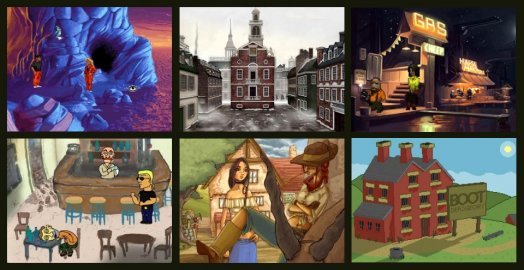
Five years ago, the thriving freeware adventure game scene wasn’t getting the press attention it deserved, and Adventure Gamers was eager to fill the void. Coordinating more than a dozen new games each month, however, promised to be a monumental task for whoever took up the challenge. The person who stepped up, as it turns out, was me. With the new role came its own new article series called Following Freeware, a monthly round-up of free game releases that has appeared almost every month since.
I remember how difficult it was compiling the very first list of indie adventures to cover, as I really had no idea how to go about finding good freeware games. Fortunately a couple of good games practically fell into my lap, so we didn’t end up with an introductory article devoid of content. The first Following Freeware was published on 29 September 2010, and was quite different from how it appears today. Back then each game had only a very brief description, and the first article had no “Other games” section. Both the search process and the articles themselves have been considerably refined over the intervening years. Now each month a selection of sites covering dozens of games are scoured for worthy fare, along with tips received directly from developers and supportive gamers. The not-so-short list from this initial process is then further whittled down to the games that deserve full coverage, and those that merit at least a single-line reference at the end. Rest assured that the games you see in the final articles are vetted and carefully selected, not just picked up at random.
Since that first article, an incredible 485 games have been covered in full, with a further 318 getting abbreviated acknowledgements. In honour of the five-year anniversary of Following Freeware, I have picked out the games that stood out for me each month since the series began. These are not necessarily the “best” games that came out in their respective months, but rather the ones that still stick in my memory, be it for an intriguing lead character, a novel premise or a particular challenge they represented. Picking out just one game per month was sometimes tough. To any developers out there reading, I can only repeat what I said at my presentation at AdventureX last year: I have enjoyed ALL of the games that have appeared in the articles, for one reason or another too numerous to mention. There is no slight intended for any game not revisited here; rather, it’s a testament to the incredible quality of adventures delivered by dedicated designers like yourselves, month after month, year after year. Keep up the good work, and keep those gems coming!
August 2010 – The Journey Down: Episode 1 - Over the Edge by SkyGoblin
This was one of the good games that just fell into my lap that very first month. At the time the forums had a separate freeware section, and Theodor Waern of SkyGoblin chose the perfect time to post about his game. The influence of LucasArts clearly came through in the feel of the game in a very positive fashion. At the same time, the tribal mask imagery on the characters gave it a distinctive look all its own. As a flagship title for a new article series extolling the wonders available on the freeware scene, this game seemed like a gift.
 Unfortunately (from this point of view) but deservedly, The Journey Down did not stay freeware for long. That first episode in a planned trilogy series went on to become updated into a commercial venture, and quite a successful one at that. This was not to be the last time that would happen to me. Whilst slightly saddened at the loss to the freeware scene, it always makes me happy to see good freeware developers go on to make money from their skills.
Unfortunately (from this point of view) but deservedly, The Journey Down did not stay freeware for long. That first episode in a planned trilogy series went on to become updated into a commercial venture, and quite a successful one at that. This was not to be the last time that would happen to me. Whilst slightly saddened at the loss to the freeware scene, it always makes me happy to see good freeware developers go on to make money from their skills.
Fortunately, the original free episode is still available from the AGS database if you want to see the origins for yourself.
September 2010 – Snakes of Avalon by Igor Hardy
Heroes in adventure games often have similar overall personalities. They tend to be clean-living types, driven on a quest to defeat the forces of evil or save the world. It would be fair to say that the hero of Snakes of Avalon is anything but clean-living. In fact, the protagonist is a raging alcoholic and the entire game may well be just a drink-fuelled hallucination. There is definitely a lot of strangeness in the game, including a conversation with a poster and the protagonist’s wallet being consumed by some strange creature in his pocket.
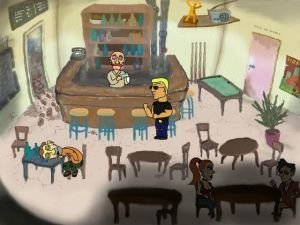 I have trouble imagining a mainstream publisher taking on a game like this. That is one of the benefits of freeware; not having to generate a return gives indie developers the freedom to do whatever they want. Admittedly, that does lead to quite a lot of rubbish that has to be sifted through each month, but the gems like this one make that sacrifice worthwhile.
I have trouble imagining a mainstream publisher taking on a game like this. That is one of the benefits of freeware; not having to generate a return gives indie developers the freedom to do whatever they want. Admittedly, that does lead to quite a lot of rubbish that has to be sifted through each month, but the gems like this one make that sacrifice worthwhile.
It may not be everyone’s cup of tea. But if you want a game outside the norm, then this one, still available on the developer’s website, is well worth checking out.
October 2010 - The Trader of Stories: Bell’s Heart by Pastel Games
Not every story needs to about a globe-trotting quest to save the world as we know it. When well put together, even the smallest of stories can provide an intriguing adventure. Such is the case in The Trader of Stories: Bell’s Heart. Travelling storyteller Myosotis is on the road when one of the wheels on her cart breaks. Seeking help in a nearby village, she is asked to gather the pieces of a local tale to pay for the services she needs.
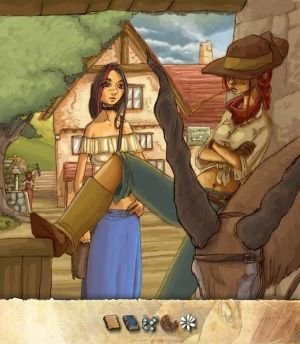 One of the things that attracted me to this game is its look. Presented in a slideshow format, the soft pastel drawings are full of miscellaneous details of local life. A run-down cottage on the edge of town forms part of the story you seek, and the local blacksmith chews a piece of straw as she waits for customers. The story is recorded in a notebook, with a picture building up one panel at a time as you gather its components. But the very mundanity of the game action – engaging in fetch quests out of necessity as a character relying on barter – makes for a soothing experience.
One of the things that attracted me to this game is its look. Presented in a slideshow format, the soft pastel drawings are full of miscellaneous details of local life. A run-down cottage on the edge of town forms part of the story you seek, and the local blacksmith chews a piece of straw as she waits for customers. The story is recorded in a notebook, with a picture building up one panel at a time as you gather its components. But the very mundanity of the game action – engaging in fetch quests out of necessity as a character relying on barter – makes for a soothing experience.
If you want to experience it for yourself, you can do so at Escape Games 24.
November 2010 – Life Flashes By by Deirdra Kiai
Even when I first put this in the article, I was of two minds whether it really belonged there. Arguably it could be considered not a game at all. When Charlotte Barclay, a writer of serious novels, is involved in a car crash, she finds herself on the brink of death. In this state she is approached by the fairy-like Trevin, who gives her the chance to relive past moments in her life. Playing through each of these moments offers her the chance to experience a different path that these events could have led to.
 To unlock the alternate timelines, you don’t have to solve complex puzzles or combine inventory in interesting ways. You simply have to work through each of the scenes of Charlotte’s actual life first. In doing so, you take a singular path based on your choices of dialogue with Trevin. The events themselves don’t change, but the meaning of those events changes based on each individual player’s interpretation of them. My version of the story no doubt differed from that of anyone else who was inspired to give it a try. It doesn’t challenge your puzzle-solving abilities, but it does challenge in other ways.
To unlock the alternate timelines, you don’t have to solve complex puzzles or combine inventory in interesting ways. You simply have to work through each of the scenes of Charlotte’s actual life first. In doing so, you take a singular path based on your choices of dialogue with Trevin. The events themselves don’t change, but the meaning of those events changes based on each individual player’s interpretation of them. My version of the story no doubt differed from that of anyone else who was inspired to give it a try. It doesn’t challenge your puzzle-solving abilities, but it does challenge in other ways.
Life Flashes By, for both Windows and Mac, is still available from the developer’s website.
December 2010 – One Chance by Awkward Silence Games
Sometimes the accuracy of science takes a back seat to the story in games. Such is the case in One Chance, where a cure for cancer mutates into a virus that will wipe out all life within six days. As one of the scientists working on the fateful project, you have a choice of how to use those last days of life. Do you desperately seek to undo what you have wrought, or do you spend that precious time with your family? Presented in a highly pixelated format, this is neither the prettiest nor most complex of games, but one particular mechanic gives it real impact.
 That mechanic is a simple one: the “one chance” of the title is quite literal. Every decision you make in the game is irreversible. There are no saved games and no restarts available. Even reloading the webpage simply presents you with the same position you were in when you initiated the reset. Without the chance to replay and try different options, each decision you make has more weight to it. Taking the noble high road and throwing yourself into research becomes a lot tougher decision when you don’t know if you are wasting your time. Alternatively, taking time with your family when that could stop you finding a way to save them is equally agonising. With one simple trick, this a game that gives any gamer pause.
That mechanic is a simple one: the “one chance” of the title is quite literal. Every decision you make in the game is irreversible. There are no saved games and no restarts available. Even reloading the webpage simply presents you with the same position you were in when you initiated the reset. Without the chance to replay and try different options, each decision you make has more weight to it. Taking the noble high road and throwing yourself into research becomes a lot tougher decision when you don’t know if you are wasting your time. Alternatively, taking time with your family when that could stop you finding a way to save them is equally agonising. With one simple trick, this a game that gives any gamer pause.
For those wishing to take that one chance for themselves, the game can still be found on Newgrounds.
January 2011 – Tales of Otubania by TomatoesInTheHead
Writing plots for games is a difficult task. You have to come up with convincing characters, a grand quest for them to be involved in, and a series of obstacles for them to pass. Doing such things properly requires a lot of time and thought. Alternatively, you could just do what this game does, and use a random story generator to throw together a quick plot for you. The plot might not necessarily make a great deal of sense (just why is Aciducer so fixated on putting a frame on a barrel?) but at least you don’t have to spend hours agonising over it.
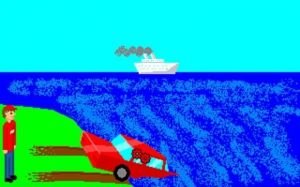 In all fairness to TomatoesInTheHead, Tales of Otubania is much more than just a series of silly tasks. The developer went to great lengths to make the disparate parts hold together, though the whole thing still has a fairly surreal feel to it. The result is a fun romp with some decent voice acting to bring the decidedly odd dialogue to life. I can’t envision the Silly Story Maker, the program used to “write” the plot, seeing great use across the adventure spectrum. The results are a little too abstract for all but the shortest of games. But, as with this game, with the right interpretation of the program’s output, you can have a lot of fun letting things get weird once in a while.
In all fairness to TomatoesInTheHead, Tales of Otubania is much more than just a series of silly tasks. The developer went to great lengths to make the disparate parts hold together, though the whole thing still has a fairly surreal feel to it. The result is a fun romp with some decent voice acting to bring the decidedly odd dialogue to life. I can’t envision the Silly Story Maker, the program used to “write” the plot, seeing great use across the adventure spectrum. The results are a little too abstract for all but the shortest of games. But, as with this game, with the right interpretation of the program’s output, you can have a lot of fun letting things get weird once in a while.
Tales of Otubania can be downloaded from the AGS database. If you want to try the Silly Story Maker yourself, that is also available for download.
February 2011 – Submerged: LaSol by WHAM
One of the most well-known engines for freeware adventure creation is the Adventure Game Studio. With its vast online community, there is a huge amount of support from budding creators out there. As well as the main engine itself, a large number of modules are freely available for various in-game effects. Add to that the active forums with tech support and a place to promote your game, and you can see why it is a popular choice for independents. The forums regularly hold competitions, the most common being One Room, One Week (exactly what its title suggests) and MAGS, a competition that allows a month to make a game on a particular theme. Submerged: LaSol was made for one of the latter, but it could easily have fit in the former with its single location gameplay.
 The requirement of these competitions is that every part of the game must be made from scratch within the time limit. It never ceases to amaze me just how complex the games made under this constraint are. This adventure has you playing a cleaner for an underwater resort, who is trapped when an accident causes the piece of corridor he is in to break off. This corridor slowly floods, so you are seeking not simply to escape, but to do so before you drown. The corridor is rendered simply but effectively, and the feeling of having to race to save yourself provides for a tense experience. I confess to never actually saving the lead character, though I believe it is possible and it doesn’t stop me from finding this to be a well-written challenge to my gaming abilities.
The requirement of these competitions is that every part of the game must be made from scratch within the time limit. It never ceases to amaze me just how complex the games made under this constraint are. This adventure has you playing a cleaner for an underwater resort, who is trapped when an accident causes the piece of corridor he is in to break off. This corridor slowly floods, so you are seeking not simply to escape, but to do so before you drown. The corridor is rendered simply but effectively, and the feeling of having to race to save yourself provides for a tense experience. I confess to never actually saving the lead character, though I believe it is possible and it doesn’t stop me from finding this to be a well-written challenge to my gaming abilities.
If you want to try to escape yourself, Submerged: LaSol can be downloaded from the AGS website.
March 2011 – The Day Nothing Happened by Creed Malay and Denzil Quixode
Adventure Game Studio has not just spawned a long list of separate games. Back in 2001, several developers decided that they wanted to do a group project. The result of that collaboration was the strange little town of Reality on the river Norm. This setting has since spawned a huge number of games over the years, each adding their own bit of oddness to the town. Even some now-famous names have contributed, with the very first game from Wadjet Eye’s Dave Gilbert being a Reality-On-The-Norm title. With resources for locations and characters free to download from the official site, anyone can have a go.
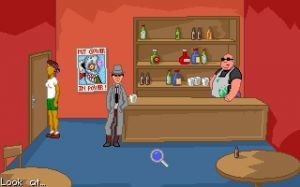 This isn’t my favourite game of the series, but it does go a long way to showcasing the content of the shared world. Playing as reporter Mika Huy, you get to meet the zombie mayor and his assistant and adviser, Death. Your quest to stop a disaster ruining the anniversary celebrations will bring you in contact with the Omni Kitten and the famous bum, whose personality changes from game to game as required for the story. New players might find themselves confused by this title, though even the official timeline is tough to follow these days. With some of the earlier games getting updates to run on modern computers, the opportunity to explore this bizarre little town continues to be open to new visitors.
This isn’t my favourite game of the series, but it does go a long way to showcasing the content of the shared world. Playing as reporter Mika Huy, you get to meet the zombie mayor and his assistant and adviser, Death. Your quest to stop a disaster ruining the anniversary celebrations will bring you in contact with the Omni Kitten and the famous bum, whose personality changes from game to game as required for the story. New players might find themselves confused by this title, though even the official timeline is tough to follow these days. With some of the earlier games getting updates to run on modern computers, the opportunity to explore this bizarre little town continues to be open to new visitors.
The Day Nothing Happened can be downloaded from the RON database.
April 2011 – Mission US: Mission 1 – For Crown or Colony? by Mission US
Educational games have got something of a bad name over the years. Too often gameplay consists of a vague attempt at interactivity to disguise the fact that you are simply doing sums or memorising facts. But occasionally a game manages to be both fun and informative at the same time. Such is the case with the Mission US series of games, which have gone to great effort to make learning a genuinely enjoyable experience. This particular instalment takes place in the events leading up to the Boston Tea Party, with players taking the part of a new apprentice in town. Three other episodes have been released to date, covering slavery, the Indian wars, and immigration.
 As well as the successful mix of knowledge and play, one thing has truly stood out about these games for me. The presentation has been very even-handed in all of them. It would be all too easy to project a political agenda through games such as these, with one side presented as angels whilst the other is shown as pure evil. It is very much to the credit of the developers that they have avoided such bias, leaving players to think about the issues themselves.
As well as the successful mix of knowledge and play, one thing has truly stood out about these games for me. The presentation has been very even-handed in all of them. It would be all too easy to project a political agenda through games such as these, with one side presented as angels whilst the other is shown as pure evil. It is very much to the credit of the developers that they have avoided such bias, leaving players to think about the issues themselves.
All of the games in the Mission US series can be either played online or downloaded from the developer’s website.
May 2011 – Sissy’s Magical Ponycorn Adventure by Untold Entertainment
If we want to continue to see good adventure games in the future, we need to start training the next generation of developers now. And as far as Untold Entertainment is concerned, they’re never too young to start. When making a game for the three-day Toronto-based TOJam, Ryan Creighton enlisted help from an unusual source: his then-five-year-old daughter Cassie, who he got to draw the graphics, write the story and voice most of the dialogue. The result was a decidedly odd adventure that nevertheless shows promise for the future.
 The tale of Sissy and her search for Ponycorns (a cross between ponies and unicorns) is a truly fantastical quest. You face off against a dastardly evil lemon, and transform a dinosaur into a somewhat less threatening form. Sissy’s dialogue is performed with breathless gusto by Cassie throughout, though Ryan hams his parts up as well. This was never going to prove the most challenging game to play, but the enthusiasm of the budding young developer makes it a heart-warming experience.
The tale of Sissy and her search for Ponycorns (a cross between ponies and unicorns) is a truly fantastical quest. You face off against a dastardly evil lemon, and transform a dinosaur into a somewhat less threatening form. Sissy’s dialogue is performed with breathless gusto by Cassie throughout, though Ryan hams his parts up as well. This was never going to prove the most challenging game to play, but the enthusiasm of the budding young developer makes it a heart-warming experience.
If you want to play the game, and maybe make a donation to Sissy’s college fund, it can be found on the developer’s website.
June 2011 – Adventure: All in the Game by Akril
When you get enthusiasts together, they will often compete on how knowledgeable they are on their favourite subject. Adventure gamers are no stranger to this, always ready to quote from their favourite games and compare the length of their played lists. In Adventure: All in the Game, Akril takes this interest in trivia even further by putting players into the often obscure settings of various adventures past. Playing an agent of the Computer Game Maintenance Squad (Adventure Games division), your job is to stop characters from escaping into other games and causing trouble.
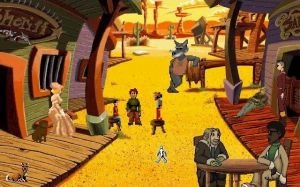 The sheer amount of adventure-related content – both locations and characters – in this game (and its predecessor Adventure: The Inside Job) is phenomenal. The opening section alone includes scenes from Space Quest 4, Grim Fandango and Toonstruck, the latter being a Wild West town that didn’t even appear in the final version of the game, having been cut from production. A subtitle option shows where all the referenced game content came from. For a gaming nerd this is a double delight, but the game is still enjoyable for those who have no idea of the original source material on display. I consider myself a fairly knowledgeable adventure gamer, but I hadn’t even heard of many of the games involved.
The sheer amount of adventure-related content – both locations and characters – in this game (and its predecessor Adventure: The Inside Job) is phenomenal. The opening section alone includes scenes from Space Quest 4, Grim Fandango and Toonstruck, the latter being a Wild West town that didn’t even appear in the final version of the game, having been cut from production. A subtitle option shows where all the referenced game content came from. For a gaming nerd this is a double delight, but the game is still enjoyable for those who have no idea of the original source material on display. I consider myself a fairly knowledgeable adventure gamer, but I hadn’t even heard of many of the games involved.
If you want to play a fun game and/or test the extent of your genre familiarity, then Adventure: All In the Game can be downloaded from the developer’s website.
July 2011 – Stealing the Diamond by Puffballs United
When people play games, they are normally in it to win it. Whilst I appreciate the effort of designers like Sierra’s in providing a wide range of entertaining death sequences, seeking out every single one was never a deliberate choice on my part. With the Henry Stickmin series of games, finding new and amusing ways to screw up is largely the point. It’s quite a change for a game to embrace failure so wholeheartedly, and I eagerly set out to try to find all the unique methods of defeat possible.
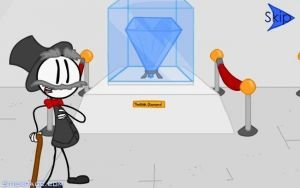 Henry is a somewhat inept criminal who fails over and over again despite being armed with an improbable array of bizarre gadgets. Anti-gravity helmets fly him off into space. Guns fail to work. Thrown objects rebound. Every game in this series has had many ways of failing, and only a handful of ways to succeed. Each action is presented as a series of choices, with the player absolved from responsibility for failure as no clues are given of the path to success. As befits the protagonist’s name, the graphics are line-drawn with stickman characters. Whilst their bodies may just be simple lines, their round heads are fully expressive and the occasional bit of clothing, such as a policeman’s hat, distinguishes the characters from each other. With a humorous script and some wonderfully over-the-top voice acting, watching Henry fail over and over again is a joy.
Henry is a somewhat inept criminal who fails over and over again despite being armed with an improbable array of bizarre gadgets. Anti-gravity helmets fly him off into space. Guns fail to work. Thrown objects rebound. Every game in this series has had many ways of failing, and only a handful of ways to succeed. Each action is presented as a series of choices, with the player absolved from responsibility for failure as no clues are given of the path to success. As befits the protagonist’s name, the graphics are line-drawn with stickman characters. Whilst their bodies may just be simple lines, their round heads are fully expressive and the occasional bit of clothing, such as a policeman’s hat, distinguishes the characters from each other. With a humorous script and some wonderfully over-the-top voice acting, watching Henry fail over and over again is a joy.
For all the fun of the failure, Stealing the Diamond is still online at StickPage.



